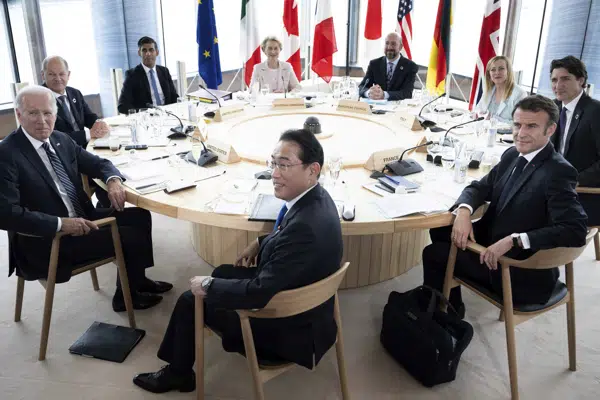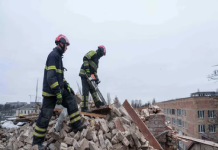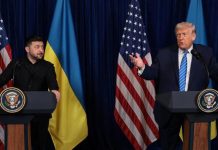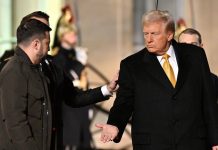HIROSHIMA (AP) – The seven industrialized nations are expected to announce a new set of sanctions against Russia during their summit in Hiroshima, Japan, to further impede the war effort in Ukraine.
Ukrainian President Volodymyr Zelensky’s visit to Japan will help highlight the need for better implementation of measures to suppress Moscow’s war machine.
Russia is currently the most sanctioned country in the world, but its effectiveness is questionable. EU Council President Charles Michel said the plan was to close loopholes and ensure that the sanctions would hurt Russia, not enforcers.
Let’s see what happens next, the sanctions so far, and the impact it has had on Russia’s economy and military efforts.
Michel said the EU’s 27 member states are focused on “closing loopholes and continuing to cut Russia off from vital sources of supply”. He is working on a plan to limit the trade in Russian diamonds and track trade to prevent Russia from circumventing regulations. Russia exports about $4 billion worth of rough diamonds each year, about a third of the world’s total, most of which is cut and polished in India. The new sanctions follow an online summit in February, where G7 leaders pledged to strengthen enforcement through a sanctions monitoring mechanism to coordinate enforcement to improve information sharing and enforcement. It promised to impose “significant costs” on other nations that circumvent or undermine it. “We will deplete Russia of the G7 technology, industrial equipment and services that underpin Russia’s war machine,” European Commission President Ursula von der Leyen said.
EU officials said on Saturday that some Chinese companies believed to supply Russia with components that could be used in military equipment were on a list of companies that could be sanctioned. Unlike other countries, China has yet to announce trade restrictions with Russia, but it has also refrained from supplying it with arms and other materials.
The list is long and even longer.
On Friday, Britain announced new sanctions against Russia’s seizure of Ukrainian grain, advanced military technology and Russia’s remaining revenue streams. The assets of 86 other individuals and entities were frozen, including Rosatom-affiliated companies supporting President Vladimir Putin’s war effort. The UK Foreign Affairs, Commonwealth and Development Office said in a statement that Russian state assets would be frozen until “they agree to compensate for the damage Russia has caused to Ukraine”.
The US has begun targeting members of Putin’s inner circle, their families and banks, who are deemed important to the Kremlin and the Russian military. The US has also tried to limit Russia’s ability to raise funds abroad. Sanctions are imposed through the Department of the Treasury’s Office of Foreign Assets Control against persons on specially designated national and prohibited entry lists. The list has expanded to include individuals and companies from around the world who have been implicated in supporting the Russian military. The organization cooperates with the Russian Elites, Deputies and Oligarchs Committee. The unit is an interagency organization that works with other countries to investigate and prosecute oligarchs and others associated with Putin.
On Friday, the State Department announced new sanctions against more than 200 companies, individuals, ships and aircraft targeting Russia’s energy, military, technology, metals and mining sectors. They also highlighted the organizations and individuals involved in the illegal deportation of Ukrainian children and the confiscation of Ukrainian grain.
The EU imposes sanctions much like those of the US, UK and Canada. The process could be a bit slower as all 27 members would need to unanimously agree, the people said. The EU has imposed 10 sanctions on Russia since President Vladimir Putin sent troops to Ukraine on February 24. Banks, businesses and the energy sector have been hit. Well over 1,000 officials have been affected by asset freezes and travel bans. Japan tightened sanctions in February, freezing the assets of Russians and Russian companies and suspending some visas. It froze the assets of some financial institutions and prohibited the export of goods that could be used for military purposes, dual-use goods, some raw materials, and semiconductors.
Canada has imposed sanctions on dozens of Russians and Russian companies, including executives from state-owned energy company Gazprom and six companies in the energy sector.
G7 officials said sanctions evasion was becoming more common. “From microprocessors and sensors for Russian cruise missiles to chips for military communications equipment, high-tech exports to third countries will continue to flow into Russia and end up in weapons used on the battlefield with Ukraine. will be taken.” We have to finish it,” von der Leyen said Friday.
Western sanctions are hurting Russia’s banks, wealthy people and technology imports. First, the ruble plummeted, foreign companies retreated, and prices rose. A senior Treasury official said US sanctions and export controls are hampering Russia’s ability to replace more than 9,000 pieces of military equipment lost in the war. But the economic life of ordinary Russians has changed very little.






